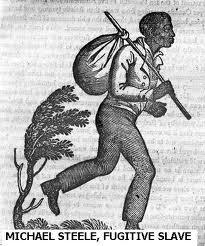"I hear a good deal said about trampling this law under foot. Why, one need not go out of his way to do that. This law rises not to the level of the head or the reason; its natural habitat is in the dirt. It was born and bred, and has its life, only in the dust and mire, on a level with the feet; and he who walks with freedom, and does not with Hindoo mercy avoid treading on every venomous reptile, will inevitably tread on it, and so trample it under foot,—and Webster, its maker, with it, like the dirt-bug and its ball." ~ Henry David Thoreau
The Fugitive Slave Act was passed September 18, 1850 as part of the 1850 Compromise between Southern slave states and Northern free states. It required states to returned escaped slaves to their owners with marshals receiving a bonus for capturing slaves and being fined $1000 if they did not arrest an alleged escapee. Private citizens were fined the same amount for providing food, shelter, or transportation to runaways. An owner could claim a slave had fled by signing an affidavit, and no jury trials were held. As a result, many free blacks were arrested and sold into slavery. Between the time the act was passed and the beginning of the Civil War, an estimated 20,000 blacks fled to Canada.
Abolitionists increased their efforts with the passage of the act, and many citizens who had previously been neutral on the issue of slavery began to oppose it because the act made all residents and elected officials responsible for enforcement. Further adding to the opposition was the publication in 1852 of Harriet Beecher Stowe's Uncle Tom's Cabin.
In November 1850 Vermont passed the "Habeus Corpus Law" requiring state officials to aid escaped slaves, thus nullifying the Fugitive Slave Act in that state. The Wisconsin Supreme Court declared the act unconstitutional in 1854, although this decision was overturned five years later. Jury nullification in other states led to those being accused of helping runaways being found not guilty, most notably a case involving the rescue of Shadrach Menkins in Boston in 1851 prosecuted by Daniel Webster.
Although part of a compromise designed to appease both sides, the act solidified the North in opposition to slavery and the demands of the South. Thus, it became one of the major causes that led to secession and the Civil War.
LOCAL UNIT INFORMATION and
BLACK HISTORY BLOG FEATURING EVENTS AND PEOPLE CONNECTED TO TEXAS OR NAACP.
SOME DAYS ARE DATE-SPECIFIC, SO CHECK THE BIRTHDAYS!
________________________________________________________________________________________________________________________
"It is certain, in any case, that ignorance, allied with power, is the most ferocious enemy justice can have." ~ James Baldwin
"Nothing in the world is more dangerous than sincere ignorance and conscientious stupidity." ~ Martin Luther King, Jr.
P O Box 1752 Paris TX 75461 ~ 903.783.9232 ~ naacp6213@yahoo.com
Meets First Thursday of Each Month at 6:00 PM ~ 121 E Booth



No comments:
Post a Comment